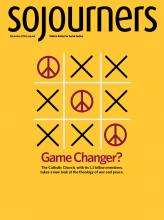WE'RE ENTERING “the most wonderful time of the year,” as the song goes. Christmas gifts are piling up. The retail stores are busy as ever. Folks are anticipating the coming weeks with lots of food and time with family. For others, excitement is not what they feel at Christmas. Instead Christmas conjures memories of loss and neglect. For many, it’s a time of pain and suffering. How is the Christian to navigate this range of experiences? We practice Advent. The church invites us to live as though Christmas can wait. We hold off on all the celebration and consumption. We learn what it means to wait for God. The pressure is pervasive to turn Christmas into being busy and buying stuff. Anxiety is high. Resentment’s in the air. Waiting, especially the Christian practice of waiting, is furthest from our minds and habits. Yet Jesus calls us to wait, to interrupt the world’s addiction during this season so that we can be surprised by Christ coming anew, in unanticipated ways. Because God is hidden. God has hidden God’s self in the most unlikely of places, in a Jewish baby named Jesus. But this is no meek and mild infant. Leave sweet baby Jesus for Ricky Bobby in Talladega Nights. The baby born to Mary is the coming Messiah who confronts the world’s violence with the way of peace. God in Jesus continues to hide in unlikely places. We learn how to wait, and pay attention, to where God will show up, to wait for the peaceable world God is birthing in our midst
Read the Full Article

Already a subscriber? Login
